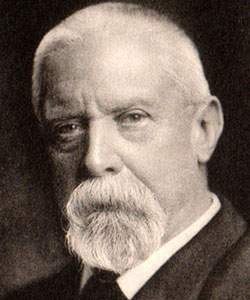Nathaniel Garland Keirle (Dickinson Chronicles)
Scholarship
Nathaniel Garland Keirle was born in Baltimore, Maryland on October 10, 1833. He was the eldest child of three born to Matthew M. Keirle and Sarah Jacobs Garland Keirle. He was raised by his grandmother, as his father died of typhoid and his mother of tuberculosis before his seventh birthday. Keirle attended St. Mary's Seminary in the city, Public School # 6, and City High School. He then enrolled at the Dickinson College Preparatory School in Carlisle, Pennsylvania for a year. Keirle entered the College proper in 1851. He was elected to the Union Philosophical Society and graduated second in his class in the early summer of 1855. He returned to Baltimore and, because he had wanted to become a lawyer, rather reluctantly entered medical studies. He earned an M.D. in 1858.
Keirle served as resident physician at the Baltimore Almshouse Infirmary for five years, at one point tackling a typhus epidemic there and winning a medal from the city for his efforts. He also served for a time as a volunteer surgeon after the battle of Gettysburg in one of the many hospitals surrounding the town, but he contracted pleurisy and returned to Baltimore. Keirle opened his own practice on West Franklin Street there and also served as the physician in charge at the City Hospital Dispensary. However, he much preferred teaching and the theoretical to practice with live patients. By 1894, he was a full professor of both Pathology and Medical Jurisprudence at the University of Maryland. Keirle also served as the medical examiner of Baltimore County, carrying out hundreds of post-mortem examinations. This experience prompted a deep interest in the rabies contagion, and he helped found the Pasteur Institute in Baltimore with himself at its head. It was this that gained him lasting fame. His work with rabies patients was unusually successful, and he published a widely admired thesis on the disease entitled Studies in Rabies in 1906.
In January 1870, Keirle married Mary Elizabeth Jones of Talbot County, Maryland. The couple had three children. Sadly, the tragedy of Keirle's early life was repeated when death visited his own family. One of his daughters died at the age of ten, his wife passed away soon after in 1882, and the following year his second daughter died at the age of sixteen. His surviving son, Nathaniel Garland Keirle, Jr., began a brilliant medical career, but died suddenly in 1908 before his thirty-fourth birthday. Nathaniel Garland Keirle himself died in Baltimore in 1918. He was eighty-five years old.
Keirle served as resident physician at the Baltimore Almshouse Infirmary for five years, at one point tackling a typhus epidemic there and winning a medal from the city for his efforts. He also served for a time as a volunteer surgeon after the battle of Gettysburg in one of the many hospitals surrounding the town, but he contracted pleurisy and returned to Baltimore. Keirle opened his own practice on West Franklin Street there and also served as the physician in charge at the City Hospital Dispensary. However, he much preferred teaching and the theoretical to practice with live patients. By 1894, he was a full professor of both Pathology and Medical Jurisprudence at the University of Maryland. Keirle also served as the medical examiner of Baltimore County, carrying out hundreds of post-mortem examinations. This experience prompted a deep interest in the rabies contagion, and he helped found the Pasteur Institute in Baltimore with himself at its head. It was this that gained him lasting fame. His work with rabies patients was unusually successful, and he published a widely admired thesis on the disease entitled Studies in Rabies in 1906.
In January 1870, Keirle married Mary Elizabeth Jones of Talbot County, Maryland. The couple had three children. Sadly, the tragedy of Keirle's early life was repeated when death visited his own family. One of his daughters died at the age of ten, his wife passed away soon after in 1882, and the following year his second daughter died at the age of sixteen. His surviving son, Nathaniel Garland Keirle, Jr., began a brilliant medical career, but died suddenly in 1908 before his thirty-fourth birthday. Nathaniel Garland Keirle himself died in Baltimore in 1918. He was eighty-five years old.
John Osborne and James W. Gerencser, eds., “Nathaniel Garland Keirle,” Dickinson Chronicles, http://chronicles.dickinson.edu/encyclo/k/ed_keirleNG.htm.



